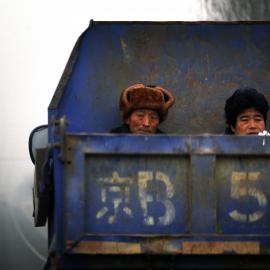Patrick Tyler replies:
I have read with interest the letters of President Carter, Zbigniew Brzezinski, and Richard Gardner (November/December 1999) and Brent Scowcroft's letter in this issue. For my biography of U.S.-China relations, A Great Wall: Six Presidents and China, I interviewed each of them, except Gardner. President Carter says my reconstruction of China-related events is "grossly biased and distorted," but he declined to "go into detail" to substantiate his assessment. He confines himself to restating many of the points made in his 1982 memoir, Keeping Faith. Like many presidential memoirs, Carter's account has significant gaps. There is no detailed reconstruction of the secret negotiations in 1978 that led to the establishment of diplomatic relations between Beijing and Washington. Carter claims there was no conflict with, or exclusion of, senior State Department officials, including Secretary of State Cyrus Vance, in the secret negotiations directed from the White House. Yet he fails to address the well-established fact that Brzezinski excluded Vance's assistant secretary of state for East Asia, Richard Holbrooke, from a critical meeting with Deng Xiaoping in May 1978, an act so disturbing to the State Department that Holbrooke and Michel Oksenberg, Brzezinski's aide on China, were at each other's throats over the custody of Deng's transcribed remarks. Carter also overlooks the fact that Vance himself was excluded from the Oval Office discussion in October 1978 in which Carter directed Brzezinski and Ambassador Leonard Woodcock to prepare a draft communique for Deng Xiaoping, at a time when Vance believed he had the president's support to first conclude the second Strategic Arms Limitation Talks (SALT), invite Leonid Brezhnev to Washington, and then normalize relations with China. Vance may have been getting copies of cables, but it is a stretch to suggest that he was an equal partner with the White House in directing the secret negotiations with China in 1978. President Carter, to whom I am grateful for requesting an expedited declassification of top-secret documents at the Carter Library related to U.S.-China normalization, should know that my account, although unsparing with regard to the bureaucratic antics of some of his senior aides, is neither biased nor distorted.
Brzezinski ill serves his president and history by accusing me of providing "fictionalized history" and a "complete fabrication." In doing so, Brzezinski disputes a minor scene in A Great Wall, that a dinner between himself, Cyrus Vance, and Richard Holbrooke took place. There is no dispute that on election night in 1976, Brzezinski and his wife dined with Vance and his wife. I attributed this vignette by footnote to Vance's memoir, Hard Choices. Richard Gardner's letter testifies that the dinner took place, albeit without Holbrooke, and he corrects my mistake that the venue was at his apartment in New York, not Holbrooke's. As for Brzezinski's assertion that I attributed to him vulgar language that he is "not accustomed to using," he himself verified to me in a tape-recorded interview that he used the cited vulgarity.
Finally, General Scowcroft confirms what is clearly stated in my book, that as the Ford administration went out, an "empty safes" order was issued as a "nondiscretionary" procedure. Yet his letter wants it both ways: Scowcroft says he (not Henry Kissinger) was in charge at the White House, but he did not issue the order. Then, he adds, an "empty safes" procedure was executed. So we agree. I can only say that I reported this "empty safes" order in my book because officials like General Scowcroft acknowledged to me that it raised a complex issue of continuity in government when one administration carries off its documents, leaving the incoming administration to reassemble them as best it can from copies scattered around the government. After Scowcroft and Kissinger left government and set up Kissinger Associates, calls for reform were raised and some reforms were implemented within the executive branch with respect to document preservation. And as it was, Holbrooke and Oksenberg went to great lengths to reassemble the U.S.-China negotiating record, including urgently flying to Ann Arbor, Michigan, to retrieve from President Ford's papers a copy of the "top-secret" transcript of the Ford-Kissinger meeting with Mao Zedong in which key American concessions were made. To incoming Carter aides and to others, it was a real issue, and I am satisfied that I reported it faithfully.
